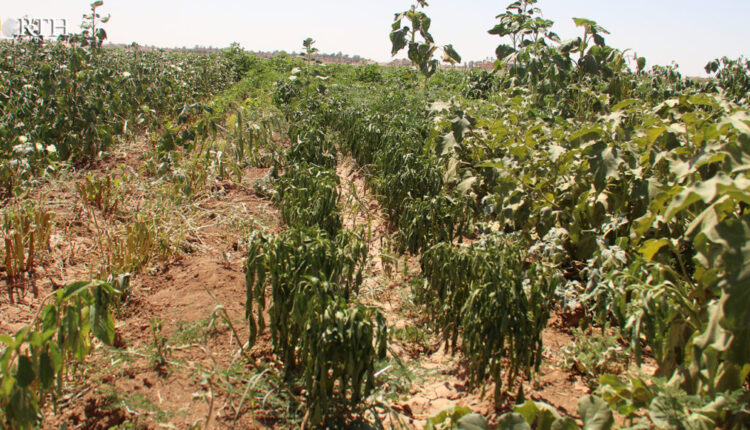
TEL TAMR, Syria (North Press) – Al-Tarkho bemoans his seasonal vegetables that became withered due to lack of watering in his land located on the bank of Khabur River in the town of Tel Tamr, north of Hasakah Governorate, northeastern Syria.
Suleiman al-Tarkho, 40, a farmer from Tel Tamr, relies mainly on water from the Khabur River to irrigate his land. He cultivated more than 25 dunams of land with various summer vegetables and cotton this year.
“We mainly depend on water from the Khabur River , which has become completely dried up now. We laid all our hopes on the river after the floods and rain filled the river at the beginning of the farming season,” al-Tarkho told North Press.
He added, “Half way into the season, the river entirely dried up. It significantly affected us. My crops are dying before my eyes, and I can do nothing.”
Livelihood
The river passes through Tel Tamer from the northwest. Over 40 villages are located on its banks, and its population depend mainly on agriculture as a source of livelihood. The water of the river is the only source to irrigate the farmlands.
Al-Tarkho planted summer vegetables such as tomatoes, cucumbers, zucchini, peppers, and other kinds to sell. However, farmers who rely on water from the river are “helpless.”
The farmer complains about “inaction” from Tel Tamr Municipality, as farmers requested many times an excavator to dig a pit near the lands so that the remaining water from the river can accumulate there, but the municipality has been unresponsive. “We looked for other machinery to dig but had no luck,” he added.
Losses of revenue
Hussein Sheikh Ali, 47, a farmer from Tel Tamr, owns 20 dunams of land on the bank of the Khabur River . He planted cotton and summer vegetables as well.
He told North Press, “We do not have wells or other water sources except this river . Now only a few swamp-like puddles are left that could provide irrigation water for one or two hours.”
“Each dunam cost me over 500,000 Syrian pounds (SYP, equals about $38). Planting my land cost me more than 14 million SYP (equals about $1,076). I feel completely frustrated and desperate,” he added.
Meanwhile, Turkey has limited the flow of water from the Euphrates River into the Syrian Territories. Regional countries and international authorities have warned against health and agricultural catastrophes in the region.
Turkey has almost entirely blocked the Kabur river since the beginning of war in Syria except for some occasions to avoid floods in its territory caused by rainwater or the melting of snow on Turkish mountains.
North Press interviewed farmers who stressed that “Their loss exceeded 60 percent of the crops. If the drought continues down this path without finding solutions, we will lose the entire season.”
In a previous statement to North Press, Muhammad Kuleib, director of the Water Resources Department in the Agriculture Directorate in Tel Tamr, affiliated with the Autonomous Administration of North and East Syria (AANES), said, “The interruption of the Khabur River ’s water negatively affects farmers who heavily rely on it in over 40 villages on its banks, irrigating more than 1,500 hectares of land.”
